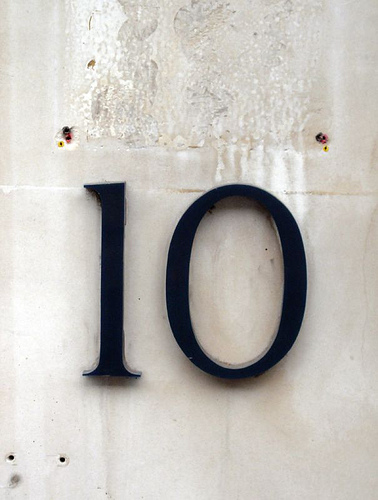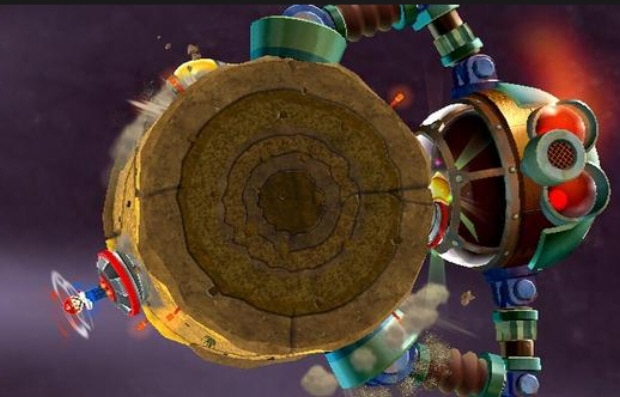There's always been a very special discussion around the prestigious 10/10. No matter how much a review explains why or how a certain game deserves the score, there will always be a heated debate on whether or not it's really a 10 game. This is, of course, a ridiculous debate, seeing as the score is an opinion of one reviewer. Not only that, the entire definition of the 10 is completely skewed. Many believe that a 10 game is supposed to represent perfection, or that a 10 game cannot have flaws. This is absolutely false. I want, with this blog, to come with an analysis of the 10, what it really means and why people should not get upset just because they don't understand the score itself. This is, not surprisingly, spurred on by the recent 10 given to Super Mario Galaxy 2, giving host to another silly bout of fanboyism. That's always lovely, innit?
I feel it appropriate to first post the definition of the score 10 (which has the subtext "Prime") on Gamespot:
"This exceedingly rare score refers to a game that is as perfect as a game can aspire to be at its time of release. Obviously, the constantly changing standards for technology and gameplay will probably make this game obsolete some day, but at its time of release, a game earning this score could not have been improved upon in any meaningful way."
This should, of course, stop anyone from claiming that a 10 should be perfection incarnate, but there's a simpler, shorter way to prove that: no game is or will ever be perfect. There are many, many reasons for this, but it would take many pages of text to fully point out why there is nothing that can be called perfect. Through extension, and working with the definition of the word itself, this means all games have flaws in some way. Simple logic, indeed, but there are hundreds that misconstrue this. There are comments like "You pointed out flaws and it gets a 10?!!? lol" However, if a 10 were to be flawless, doesn't that mean that no game would ever get a 10? This leads me to the next group: those that think 10s are absolutely unachievable.

-I know that one of those games is called "Perfection", but I'd be wary of getting this game.
One thing that every reviewer must understand is that the 1-10 system is a scale. If we'd use math to explain it further, the 1-10 system would be a linear graph with a definite slope. There is absolutely no point in having the 10 if it's impossible, we'd then have a 1-9.9 scale which would defeat the purpose of even having the 10 anyway. I think it would be interesting to list all "10 games" currently on Gamespot, which are now seven total:
The Legend of Zelda: Ocarina of Time (Nintendo 64) (1998 )
SoulCalibur (Dreamcast) (1999)
Chrono Cross (PlayStation) (2000)
Tony Hawk's Pro Skater 3 (PlayStation 2) (2001)
Grand Theft Auto IV (PlayStation 3, Xbox 360) (2008 ) (Video Review)
Metal Gear Solid 4: Guns of the Patriots (PlayStation 3) (2008 ) (Video Review)
Super Mario Galaxy 2 (Wii) (2010) (Video Review)
What does this list show us? Firstly, they are all completely different in content, whether it be technical prowess, story, gameplay and even genre, meaning that they can't be compared by using the score. Secondly, each and every one of the games above has flaws (despite Jeff's over-enthusiasm in the OoT review). Once again, I don't think I have to point out the flaws for it to be so. However that doesn't mean that the games aren't worth 10s. They're just the pinnacle of gaming at each time, namely the time of their release. This isn't hard to understand, nor is it illogical in any way. If you say that "10s are unattainable", you're just fooling yourself. It's cool if you haven't found a game worth the score, but deciding that no game shall ever get it is ignorant at best.

-Such a fuss over a single number...
I touched upon a rather significant factor in the last paragraph, and that is that you can't compare games that are in different genres, and in many ways, it's tough to compare some games even within the genre. This is simply because the score given to a game is not a comparative value, it's an intrinsic one, based on the individual qualities of the specific product. The fact that this is often confused is maybe the biggest reason that 10s cause such commotion. It starts ignorant comments like "So X game is better than Y game?! I disagree, so you must be wrong!" This is a fallacy, and it's important to remember that you shouldn't take the scores at face value anyway. It's astounding to see so many feeling personally insulted because of one score. It's progressed to the point that many give the "10 games" 1.0s just to lower the user score. As proof of this, look at the user score pie chart of SMG2. It would be OK to see a normal dispersion of scores, but about 60% is 9.5-10, while there's a shocking number of plain 1.0s. I'm all for opinion, but let's contemplate two things:
1) I'm against overall anyone reviewing the game at this point in time, it's almost impossible that anyone got all the stars in the game so incredibly quick. Not only that, most of the reviews are ridiculous, offering no reasoning at all.
2) 1.0s are reserved for the absolute worst, which are plagued with glitches, developer mistakes and are generally unfinished. Are people actually giving SMG2 a similar score as Big Rigs: Over the Road Racing and Superman? Really? If anyone that does this happens to be reading right now, I have just one thing to say: shame on you. Just...wow.

-You're right, this DOES remind me of Super Mario Galaxy 2.
Another thing that is important to remember is that there are no limiting factors to a "10 game" other than it being an absolutely superb experience. Many have thrown around that a "10 game" needs a good story. Hogwash. That may be how you define it, but saying that as a blanket statement is simply wrong in every way. We play games to play them, gameplay should be all that matters at the end of the day. If a fantastic story happens to follow, fantastic! If not, then let's hope the gameplay makes up for it, and in many cases it does indeed do so.
It's of course a flawed approach to really put any specific rule to the ultimate score. Different people value different things , not only in gaming, but also in film, literature, music and art. Some look at the Mona Lisa and see the best painting in existence. Others see just one more model smiling enigmatically at the frame, perhaps wondering whether anyone would try and analyze its meaning. Video games are even more fickle. One person might love a game, while another can just hate it to pieces. Just the fact that this large divide can exist is a testament to the impossibility of any concrete score. People have to stop taking scores so seriously, and look at the big picture instead. More importantly, everyone should be given the sempiternal chance to enjoy a game, without fretting that someone, somewhere, might disagree.

-Let's just play games and enjoy them!
Of course, one person calling another person's opinion wrong isn't anything new on the worldwide web, but it's always most prominent when the good ol' 10 comes aknockin' (outside of maybe hyped games getting lower than the expected scores, which is something for another blog). It's human nature to sometimes get upset when you don't completely agree with someone else, but it will always be a mystery to me why people complain about 10s. When I see a 10, I say: "Great! Another game that will be enjoyed by thousands." Some seem to get the opposite reaction, but I think I can safely say that they are the wrong ones in this situation. Games are to be played, enjoyed, maybe even loved. And I'm sticking with that philosophy 'till the day I die.
-Calvinsora